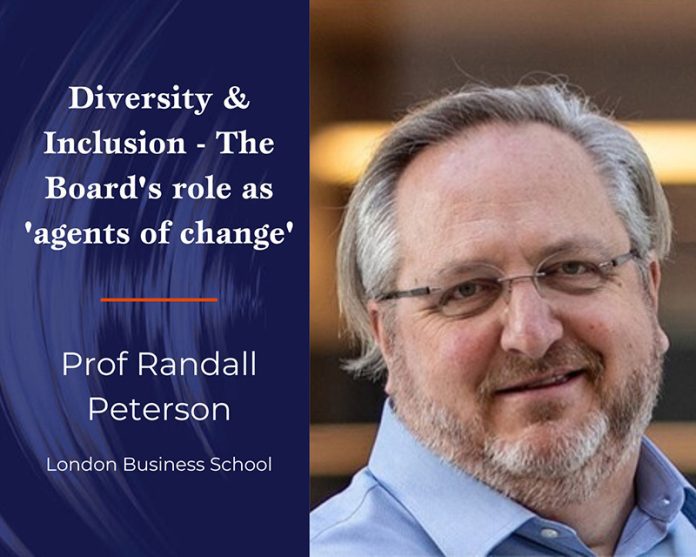The podcast and the article are brought to you by The Better Boards Podcast Series.
In this podcast, Dr Sabine Dembkowski, Founder and Managing Partner of Better Boards, discusses with Professor Randall Peterson the role of the board in helping organisations become better at dealing with diversity – moving beyond the presence of diversity to being able to engage diversity to benefit the organisation.
Randall is Professor of Organisational Behaviour at London Business School, and his recent work includes a report for the Financial Reporting Council on board diversity. He has been active on the board of UN Women UK, and is currently serving on the Leaders as Change Agents** board, an expert panel working through the Government Equalities Office to facilitate positive change in the UK’s largest employers.
His book entitled “Disaster in the Boardroom: Six Dysfunctions Everyone Should Understand” combined with 30 years of award-winning research on boards gives him a unique and deep understanding of the role of the board in creating meaningful change.
“We know something about what goes wrong – There’s a parallel track…”
Randall describes the wide range of research he has looked at in depth with over 100 directors and company secretaries, which has given very consistent results. To gain multiple perspectives, usually two or three people per board were questioned. He also describes writing his book about disaster in the boardroom, which documents 300 years of mistakes, and companies that have made outrageously bad decisions, looking for patterns. With examples going back over 300 years, six different distinct trajectories towards failure were identified. Also, with his work with LACA** the idea emerged that instead of focusing on what boards do wrong, it is time to focus on how to do things right.
“Adding diverse voices to the mix is not enough”
Randall explains that although diversity can benefit your business, there is no guarantee that it will unless you embrace it, by doing the inclusion work engagement, which is hard to do. Well-managed diversity leads to tangible changes in the culture of how a board operates and interacts (making it for example more inclusive and collaborative), and this has positive effects on the bottom line and corporate value. He believes that much of the effort in the diversity space is too focused on making boards feel bad and afraid to make mistakes, both individually and collectively as a board. His research has also shown that most directors get little to no support, training or education for being a director.
“Stop saying that diversity is going to get you a better outcome”
To be world class, you have to be diverse, because the research shows more diverse groups produce more diverse outcomes. The very best groups are highly diverse, but so are the worst ones. Randall outlines some areas where his research was surprising. Firstly, the business case for diversity as traditionally formulated can actually have a strong negative impact. When you diversify and put a spotlight on people who are different it can feel threatening, and actually diminish the performance of your newly diverse management team. Secondly, Randall found that boards that are really good on one type of diversity are typically not great at another. There were boards that were really good at gender, but not very good at race and ethnicity, and vice versa. There is now a better understanding that the barriers to entry for different groups is different. So what helps recruit and retain women for the board may not recruit and retain a person of colour. Best boards figure out that recruiting and retaining each type of diversity requires a slightly different journey to success.
“Having a growth mindset, focusing on how we can get better outperforms any other culture”
Randall finds that interviewees are often somewhat reluctant to talk about demographic diversity, because they don’t want to ‘get it wrong’. Most care deeply about diversity and should be a little more brave in raising those issues in conversation, in nomination processes etc. He wants to encourage people to have these conversations, being positive about what can be done, and what can be done better. The research shows very clearly that having a growth mindset, focusing on “how we can get better” outperforms any other culture, in terms of ways of working.
Randall warns that to hire for diversity, if looking for a very specific skill set it can obviously be difficult to find a diverse candidate with the right experience. But sometimes it can be too easy just to say there isn’t such a person, especially if using the big recruiters. It is very worth searching out some of the smaller search firms who specialise in this area. It is possible there is a pool of people out there who are not overcommitted, who are very qualified, and who would make great directors.
The three top takeaways from our conversation are:
- The importance of being willing and able to be an advocate for diversity, as there are often a lot more allies around the table than we typically anticipate.
- Every single director has a role to play in creating a culture of learning and growth, and a focus on ‘how do we get better’, instead of ‘what we do wrong’. Focus on what can be improved.
- To identify a diverse set of directors successfully, pause the search and seek out a smaller search firm that specialises in different groups of people, because there are a lot of highly qualified, highly motivated, great potential directors waiting to be found.
** Leaders as Change Agents (LACA) was formed in 2019 and has been working with the UK government, subject matter experts at Deloitte and prominent businesses to undertake extensive research of available best practice to develop the Employer & Employee Guide framework, available free from www.leadersaschangeagents.com. At the core of the framework are 8 foundational principles, drawn from available best practice, central to developing a modern, competitive EVP. The framework guide is well supported by many business leaders, as well as by London Business School.
The eight commitments in the LACA Guide:
- Empowerment and choice
- Diversity, Equity, and Inclusion
- Growth and Diversity
- Commitment and Engagement
- Participation in DM
- Work/Life Balance
- Fairness
- Recognition and Reward
Don’t forget to subscribe never to miss an episode of the Better Boards Podcast Series. Available on their website, Apple, Spotify or Google.
To find out how you can participate in the Better Boards Podcast Series or more information on Better Boards’ solutions, please email us at [email protected].


























![“Does Everyone Hear Me OK?”: How to Lead Virtual Teams Effectively iStock-1438575049 (1) [Converted]](https://www.europeanbusinessreview.com/wp-content/uploads/2024/11/iStock-1438575049-1-Converted-100x70.jpg)





